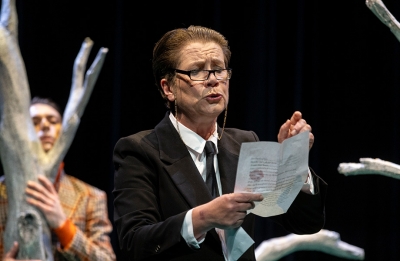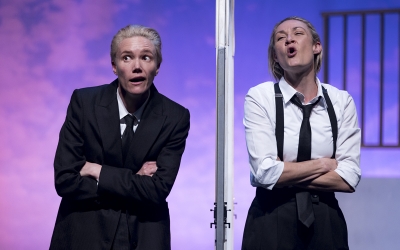Bell Shakespeare
Shakespeare’s Twelfth Night is a perennial favourite on the Shakespeare calendar (pun intended). The twelfth night of Christmas celebrations was the olden-day version of New Year’s Eve, not because it was the last day of the year but because it was the last day of festivities, with everything returning to normal after the hangover. As such, it was celebrated as a topsy-turvy night where homeowners would play servant to their servants and bring them gifts, with much frivolity and goodwill – a bit like the boss getting pissed at the staff party.
... (read more)Bell Shakespeare’s latest production of Shakespeare’s Romeo and Juliet (directed by Peter Evans) is punctuated by stand-out performances: Lucy Bell, as the Nurse to Juliet, steals the show early, with her accounts of Juliet’s birth and growing up; she lends warmth and a sense of time and place that allows this loving and loveable character to shine...
... (read more)One thing is certain: Shakespeare’s The Comedy of Errors is flat out hilarious, and if it isn’t funny enough on stage, it’s the fault of the production. His only farce, it is often thought to be an early work, but it is surely far too assured to be written before 1594. It’s entirely free of the striving Marlovian rhetoric that hampers the Henry VI plays (commenced in 1591), and it is cleaner, cleverer, and more convincing than The Taming of the Shrew (probably before 1592). It is based on Plautus’s Menaechmi ...
... (read more)Back in 1991, Bell Shakespeare opened their very first season with Hamlet, starring John Polson and directed by John Bell himself; it deliberately highlighted the Australian vernacular, almost over-emphasising the flat vowel sounds and local cadences over the fruitier delivery we inherited from the British. It had a gritty contemporary setting, and garishly over-the-top costumes. It also wasn’t very good.
... (read more)What can you do with Shakespeare’s Titus Andronicus, a play full of murder, mutilation, and rape, culminating in a mother eating a pie filled with her sons’ ground-up body parts? For centuries it was dismissed as the early aberration of a genius, a sop to the bloodthirst of Elizabethan audiences ...
... (read more)There is much conjecture around the concept of Shakespeare’s ‘problem plays’; critics disagree not only on the strict meaning of the term – F.S. Boas saw them as works that used a protagonist’s dramatic situation to illustrate a social problem, while Ernest Schanzer insists they turn on an ethical dilemma ...
... (read more)At first glance, Molière’s The Miser, or L’Avare in the original French as first performed in 1668, contains the seeds of drama. Harpagon, an avaricious father, unceasingly heartless towards his grown son and daughter, and paranoid they will steal his beloved fortune, sounds like the stuff of tragedy ...
... (read more)









